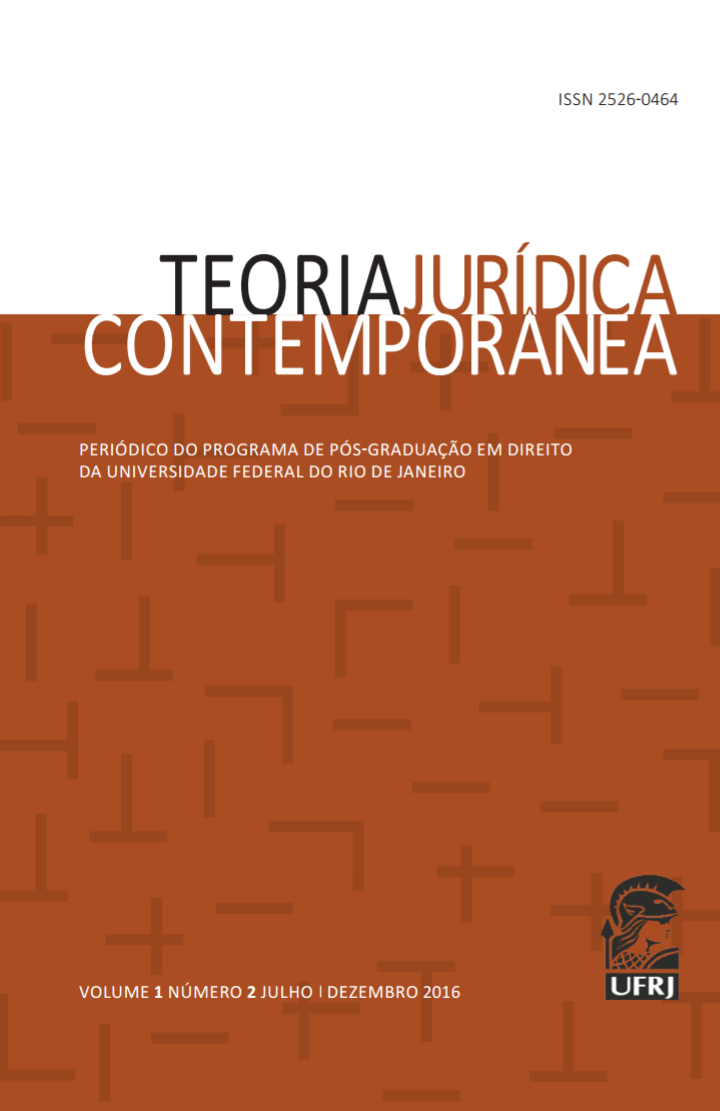Em defesa do Direito Probatório fundado em regras - e da Epistemologia também
DOI:
https://doi.org/10.21875/tjc.v1i2.11727Palavras-chave:
Direito probatório, Epistemologia, Regras excludentes, Evidence Law, Epistemology, Exclusionary RulesResumo
RESUMO:
Desde que Jeremy Bentham escreveu a sua severa crítca ao Direito Probatório, filósofos e juristas têm critcado as regras probatórias excludentes argumentando que as regras formais que excluem classes inteiras de provas em razão da sua alegada infabilidade violam máximas epistemológicas fundamentais que exigem que toda prova pertinente seja levada em consideração. Embora algumas partes da prova possam ser excluídas por falta de fabilidade -- argumentam eles -- seria um erro fazer tais juízos em relação a categorias inteiras, em oposição a fazê-los somente em relação à provas específcas apresentadas para propósitos específicos. Este artgo põe em causa essas alegações, argumentando que exclusões fundadas em regras servem a propósitos similares àqueles desempenhados pelas regras nas teorias morais consequencialistas de regras, e que, de maneira ainda mais importante, elas são totalmente consistentes com a natureza excludente das regras jurídicas em geral. Na verdade, uma vez visto o papel que as regras excludentes podem desempenhar na Epistemologia Jurídica, se torna possível ver que elas poderiam ter um papel a desempenhar na avaliação epistêmica em geral.
ABSTRACT:
Ever since Jeremy Bentham wrote his scathing critique of the law of evidence, both philosophers and legal scholars have criticized the exclusionary rules of evidence, arguing that formal rules excluding entre classes of evidence for alleged unreliability violate basic epistemological maxims mandating that all relevant evidence be considered. Although particular pieces of evidence might be excluded as unreliable, they argue, it is a mistake to make such judgments for entire categories, as opposed to making only in the context of particular pieces of evidence offered for specifc purposes. This paper challenges these claims, arguing that rule-based exclusions serve similar purposes to those served by rules in rule-consequentalist moral theories, and that, even more importantly, they are entirely consistent with the exclusionary nature of legal rules in general. Indeed, once we see the role that exclusionary rules might serve in legal epistemology, we can see that they might have a role to play in epistemic appraisal more generally.
Downloads
Referências
ALEXANDER, Larry & SCHAUER, Frederick. Law's Limited Domain Confronts Morality's Universal Empire. William & Mary Law Review , v. 48, p. 1579--1607. 2007.
BAYLES, Michael D. Contemporary Utilitarianism. New York: Anchor Books, 1968.
BENTHAM, Jeremy. Rationale of Judicial Evidence: Specially Applied to English Practice. MILL, John Stuart (ed.). London: Hunt & Clark, 1827.
DAMAÅ KA, Mirjan. Free Proof and Its Detractors. American Journal of Comparative Law, v. 43, p. 343--71. 1995.
DWYER, Déirdre. Review of Foundations of Evidence Law, by Alex Stein. Law, Probability and Risk, v. 5, p. 75--85. 2006.
GOLDMAN, Alvin I. Epistemology and Cognition. Cambridge, MA: Harvard University Press, 1986.
GOLDMAN, Alvin I. Knowledge in a Social World. Oxford: Clarendon Press, 1999.
HAACK, Susan. Epistemology Legalized: Or Truth, Justice, and the American Way. American Journal of Jurisprudence, v. 49, p. 43--61, 2004.
HARE, R. M. Moral Thinking: Its Levels, Method and Point. Oxford: Clarendon Press, 1981.
HOOKER, Brad. Ideal Code, Real World. New York: Oxford University Press, 2000.
JOHNSON, Conrad D. Moral Legislation: A Legal-Politcal Model for Indirect Consequentialist Reasoning. Cambridge: Cambridge University Press, 1991.
KIM, Jaegwon. What is ‘Naturalized Epistemology'? Philosophical Perspectives, v. 2, p. 381--405. 1988.
KRONMAN, Anthony. Max Weber. Stanford: Stanford University Press, 1983.
LAUDAN, Larry. Truth, Error and the Criminal Law: An Essay in Legal Epistemology. Cambridge: Cambridge University Press, 2006.
LYONS, David. The Forms and Limits of Utilitarianism. Oxford: Clarendon Press, 1965.
POSTEMA, Gerald J. Bentham and the Common Law Tradition. Oxford: Clarendon Press, 1986.
RAZ, Joseph. The Authority of Law: Essays in Law and Morality. Oxford: Clarendon Press, 1978.
ROBERTS, Paul. “Rethinking the Law of Evidence: a Twenty-First Century Agenda for Teaching and Research.” In ROBERTS, P. & REDMAYNE, M. (eds.), Innovations in Evidence and Proof, pp. 21--63. Oxford: Hart Publishing, 2007.
SCHAUER, Frederick. Playing By the Rules: A Philosophical Examination of Rule-Based Decision-Making in Law and in Life. Oxford: Clarendon Press, 1991.
SCHAUER, Frederick. On the Supposed Jury-Dependence of Evidence Law. University of Pennsylvania Law Review, v. 155, p. 165--202. 2006.
STEIN, Alex. Foundations of Evidence Law. Oxford: Oxford University Press, 2005.
THAYER, James Bradley. A Preliminary Treatise on Evidence at the Common Law. Boston: Litle, Brown and Company, 1898.
TWINING, William. Theories of Evidence: Bentham and Wigmore. London: Weidenfeld & Nicolson, 1985.
TWINING, William. Rethinking Evidence: Exploratory Essays. Evanston, IL: Northwestern University Press, 1994.
WIGMORE, John Henry. The Science of Judicial Proof. Boston: Litle, Brown and Company, 1937.
Downloads
Publicado
Edição
Seção
Licença
Os autores que publicam nesta revista concordam com os seguintes termos:
- Os autores mantêm os direitos autorais e concedem à revista o direito de primeira publicação, com o trabalho simultaneamente licenciado sob a Licença Creative Commons Attribution que permite o compartilhamento do trabalho com reconhecimento da autoria e publicação inicial nesta revista.
- Os autores têm autorização para assumir contratos adicionais separadamente, para distribuição não-exclusiva da versão do trabalho publicada nesta revista (ex.: publicar em repositório institucional ou como capítulo de livro), com reconhecimento de autoria e publicação inicial nesta revista.
- Os autores têm permissão e são estimulados a publicar e distribuir seu trabalho online (ex.: em repositórios institucionais ou na sua página pessoal) a qualquer ponto antes ou durante o processo editorial, já que isso pode gerar alterações produtivas, bem como aumentar o impacto e a citação do trabalho publicado (Veja O Efeito do Acesso Livre).
Este obra está licenciado com uma Licença Creative Commons Atribuição-CompartilhaIgual 3.0 Brasil.


